When Chinchillas Chew: Understanding Their Need to Gnaw
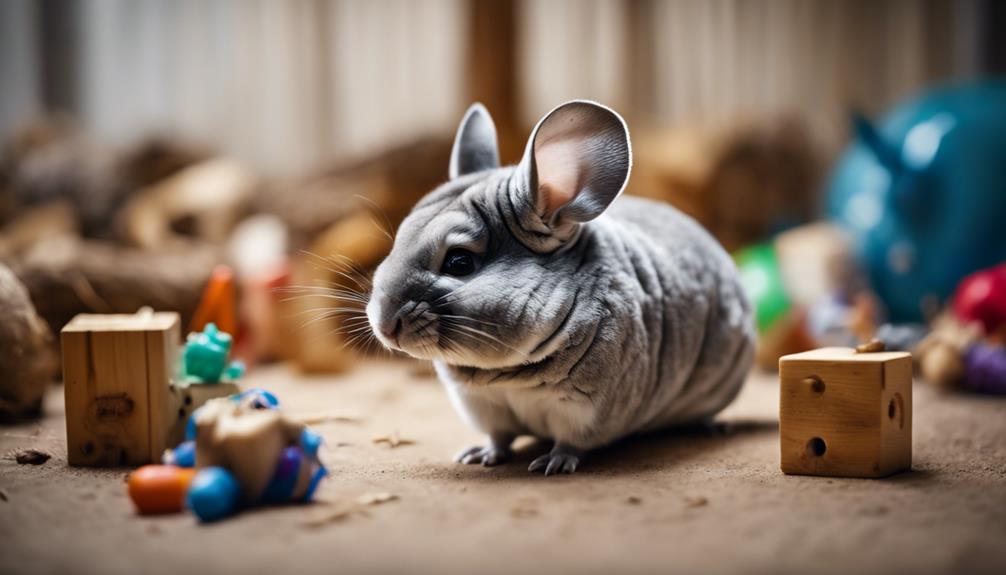
Chinchillas chew as a way to keep their teeth healthy and to satisfy their natural instincts. In the wild, they would gnaw on branches and bark to wear down their constantly growing teeth. It is important for chinchilla owners to provide proper outlets for this need to chew, such as wooden toys and chew sticks. Failure to do so can lead to dental problems and behavioral issues. By understanding and accommodating their natural behavior, chinchilla owners can ensure the health and happiness of their furry friends.
Chinchillas' teeth continue to grow throughout their lives, so providing them with plenty of safe items to chew on is essential. Wood blocks, safe branches, and chew toys made specifically for chinchillas are all good options. Avoid giving them items that are too hard or small, as they can cause dental damage or choking hazards. Additionally, regularly monitoring their teeth and providing a balanced diet can help prevent dental issues.
In conclusion, chinchillas chew to maintain their dental health and fulfill their natural instincts. Providing appropriate chew toys and monitoring their teeth are crucial aspects of caring for these small mammals. By understanding why chinchillas chew and how to meet this need, owners can help ensure their pets live long, healthy lives.
Chinchilla Chewing Instincts
Chinchillas instinctively chew regularly to maintain their dental health and fulfill their natural urge to gnaw on objects. This behavior is deeply rooted in their natural instincts and serves various essential purposes for these adorable creatures.
When chinchillas chew, they aren't only keeping their teeth healthy by preventing overgrowth, but they're also satisfying their need for mental and physical stimulation. Providing proper chinchilla enrichment is crucial to ensure they have suitable items to chew on, such as wooden toys, hay, and safe chew sticks.
These activities mimic their natural behaviors in the wild, where they'd gnaw on bark and twigs to wear down their teeth and keep them in good shape. Understanding and respecting a chinchilla's innate drive to chew is vital for their overall well-being and happiness.
Dental Health Importance
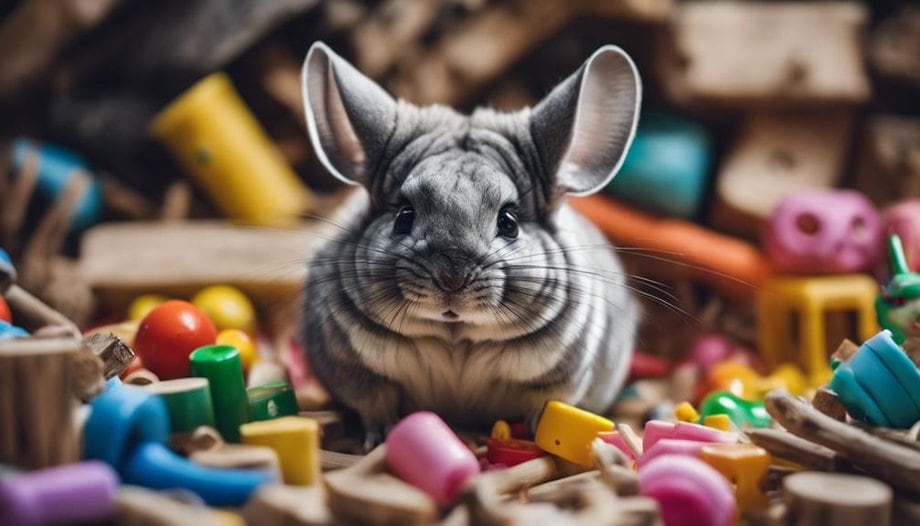
Maintaining good dental health is crucial for the overall well-being of chinchillas. Proper dental care is essential to prevent tooth decay and maintain oral hygiene. Chinchillas' chewing habits play a significant role in their dental health, as constant gnawing helps wear down their continuously growing teeth and prevents overgrowth issues that can lead to dental problems. Regularly monitoring your chinchilla's teeth and providing appropriate chew toys are essential aspects of their dental care routine.
To emphasize the importance of dental health for chinchillas, consider the following table:
| Dental Health Importance | Key Points |
|---|---|
| Tooth Decay Prevention | Regular chewing helps prevent decay |
| Oral Hygiene | Chinchillas need proper dental care |
| Chewing Habits | Natural behavior crucial for dental health |
Suitable Chew Toys
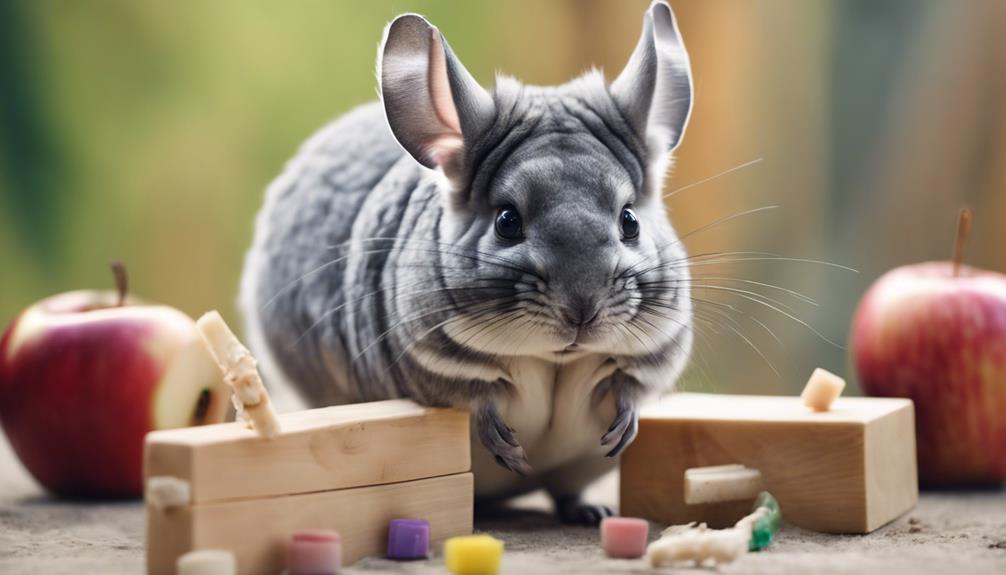
Properly selected chew toys cater to chinchillas' natural gnawing instincts and contribute significantly to their dental health maintenance. Chinchillas have continuously growing teeth, and providing them with suitable chew toys is crucial for preventing dental issues.
Here are four types of chew toys that can enrich a chinchilla's environment while alleviating boredom:
- Wooden Chew Blocks: These blocks made from safe woods like apple, pear, or kiln-dried pine are excellent for chinchillas to gnaw on. They not only help in wearing down their teeth but also provide mental stimulation.
- Willow Balls: Willow balls aren't only fun for chinchillas to play with but also serve as great chew toys. The fibrous texture of willow helps in promoting dental health.
- Pumice Stones: Chinchillas enjoy gnawing on pumice stones, which are great for keeping their teeth in check. These stones also offer a different texture for added enrichment.
- Cardboard Tubes: Empty toilet paper rolls or cardboard tubes are simple yet effective chew toys. Chinchillas love to shred and nibble on these, keeping them engaged and their teeth healthy.
Preventing Destructive Behavior
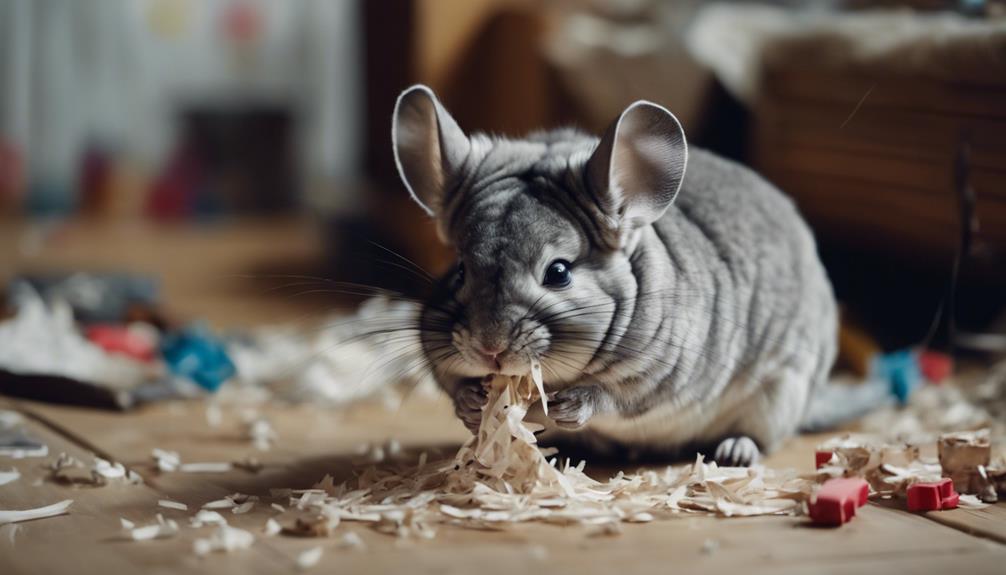
To deter destructive behavior in chinchillas, providing appropriate outlets for their natural instincts is essential. Chinchilla training is crucial in addressing destructive habits like excessive chewing. Behavioral enrichment plays a significant role in keeping chinchillas engaged and preventing destructive behaviors.
Chinchillas are naturally inclined to chew due to their continuously growing teeth. It's vital to offer a variety of safe chew toys to redirect their chewing behavior. Additionally, spending quality time interacting with chinchillas through play and training can help in preventing destructive habits.
Creating a stimulating environment with items like wooden blocks, lava ledges, and safe chew sticks can aid in satisfying their chewing instincts. Regularly rotating and introducing new toys can keep chinchillas mentally stimulated and less likely to engage in destructive chewing behaviors.
DIY Chinchilla Chew Toys
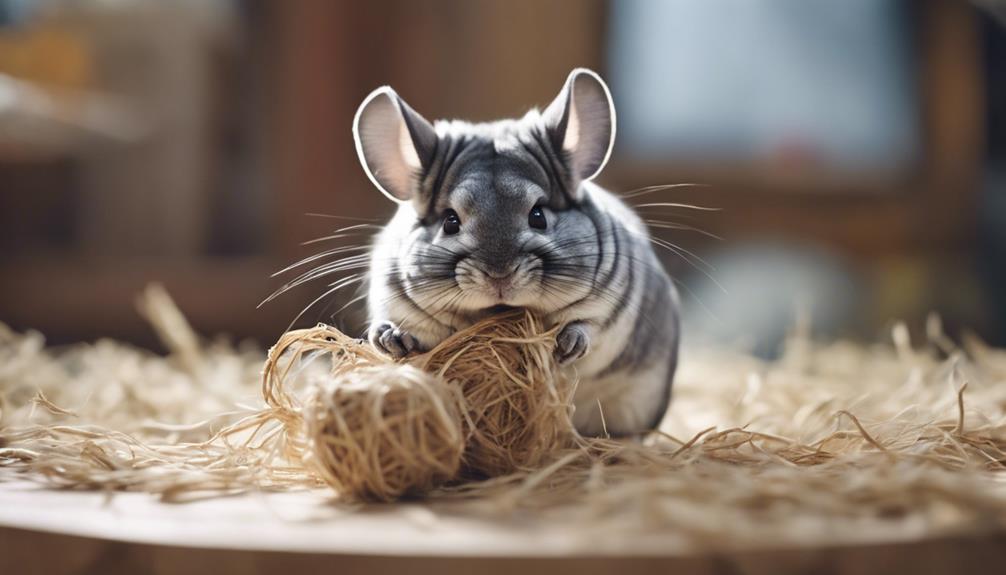
When crafting DIY Chinchilla Chew Toys, owners can explore using safe and natural materials to provide engaging and enriching chewing options for their furry companions. Homemade alternatives offer a cost-effective and customizable way to cater to a chinchilla's chewing needs.
Toy rotation ensures that the chinchilla remains stimulated by introducing new textures and flavors periodically. Owners can consider making chew toys from untreated wood blocks, applewood sticks, or hay cubes to promote dental health and prevent boredom.
Incorporating items like pumice stones or seagrass balls can add variety to the chinchilla's chewing experience. By creating DIY chinchilla chew toys, owners not only provide a safe outlet for their pets' natural chewing instincts but also foster a bond through the care and effort put into crafting these enriching toys.
Supervision and Safety Measures
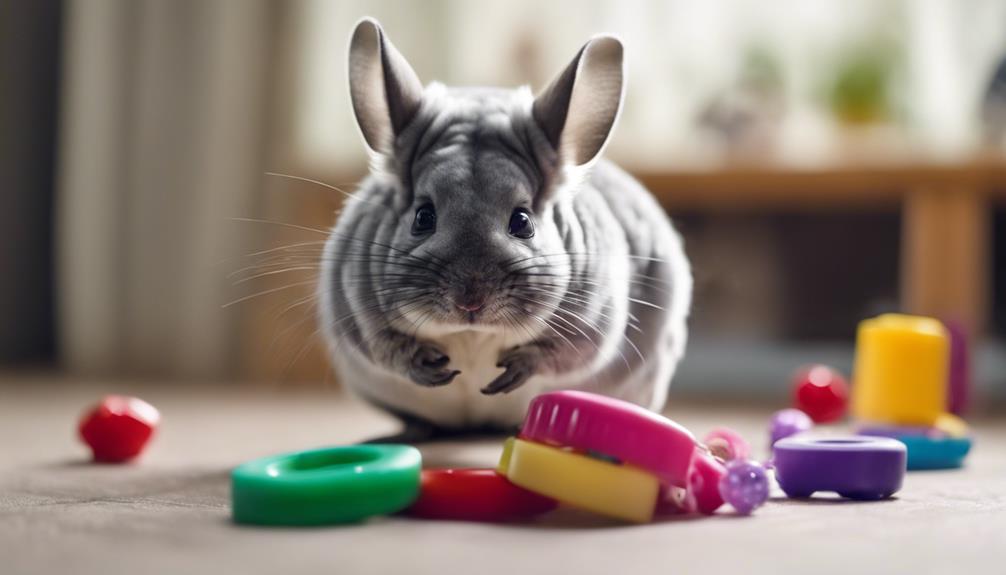
When caring for chinchillas, it's crucial to provide them with safe chew toys to satisfy their natural gnawing instincts. Owners should closely monitor their chinchillas' chewing behavior to ensure they're using appropriate toys and not ingesting harmful materials.
Additionally, creating a chinchilla-proof play area can help prevent accidents and keep these curious pets out of dangerous situations.
Chew Toys for Safety
Supervising a chinchilla with its chew toys is crucial for ensuring its safety and well-being. To provide the best care, consider the following safety measures:
- Quality Materials: Opt for chew toys made from safe materials like untreated wood or apple sticks to prevent harmful chemicals from being ingested.
- Size Matters: Choose toys that are appropriate for your chinchilla's size to avoid any potential choking hazards.
- Supervision: Always monitor your chinchilla while they're playing with their toys to quickly address any issues that may arise.
- Rotation: Rotate the toys regularly to keep your chinchilla engaged and prevent boredom, promoting both dental health and mental stimulation.
Monitor Chewing Behavior
To ensure the well-being of your chinchilla, closely monitoring its chewing behavior is essential for maintaining their safety and health. Observing the chewing frequency can provide insights into their dental care needs. Chinchillas have a natural inclination to chew, but excessive or reduced chewing may indicate underlying issues.
By paying attention to their behavioral patterns, such as changes in appetite or energy levels, you can detect potential problems early. Implementing positive reinforcement training techniques can help guide your chinchilla's chewing habits towards appropriate items.
Regularly checking their chew toys for signs of wear and providing suitable replacements is crucial. By staying attentive to your chinchilla's chewing behaviors, you can ensure a safe and enriching environment for your furry friend.
Chinchilla-Proof Play Area
Creating a safe and engaging play area for your chinchilla involves implementing meticulous supervision and essential safety measures. To ensure your chinchilla's playtime is both fun and secure, consider the following:
- Playpen Setup: Use a sturdy playpen with narrow bar spacing to prevent escapes and injuries.
- Playtime Rules: Establish time limits for play sessions to prevent overexertion and monitor interactions.
- Play Area Enrichment: Include safe toys like wooden blocks and chew sticks to keep your chinchilla mentally stimulated.
- Safe Boundaries: Inspect the play area for any hazards such as exposed wires or toxic plants that could harm your furry friend.
Encouraging Healthy Chewing Habits
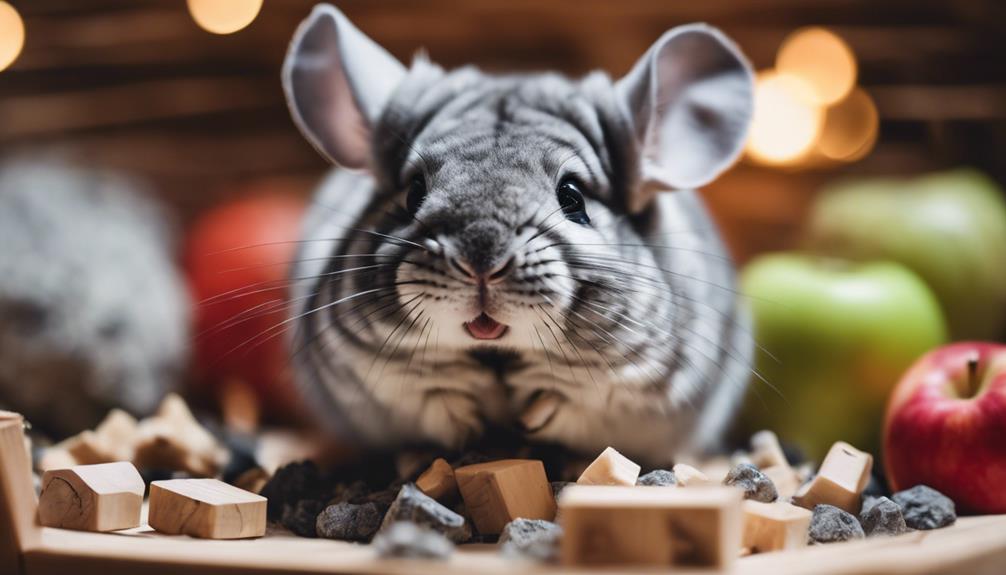
Encouraging healthy chewing habits in chinchillas involves providing a variety of safe chew toys and regularly inspecting them for wear and tear. Training techniques and behavior modification can be used to redirect their chewing behavior towards appropriate items.
When offering chew toys, consider natural alternatives like applewood sticks or pumice stones, which not only satisfy their chewing instincts but also provide essential dental wear. Boredom busters such as hanging wooden toys or treat-filled balls can keep chinchillas engaged and less likely to resort to destructive chewing.
It's crucial to rotate their toys regularly to prevent boredom and maintain their interest. Additionally, monitoring their chewing habits and adjusting their environment accordingly can help promote healthy behaviors.
Frequently Asked Questions
Can Chinchillas Safely Chew on Cardboard or Paper Products?
Chinchillas should avoid chewing on cardboard or paper products. It's essential to provide safe alternatives like wooden chew toys to satisfy their gnawing instincts. Ensuring their environment is filled with appropriate items promotes their well-being.
How Often Should Chinchilla Chew Toys Be Replaced?
Chinchilla chew toys should be replaced regularly to ensure proper chinchilla dental care and maintain chinchilla cage safety. Over time, toys can wear down or become hazardous. Check for signs of damage and replace as needed.
Are There Any Natural Alternatives to Store-Bought Chew Toys?
When seeking natural alternatives to store-bought chew toys for chinchillas, consider using homemade options crafted from organic materials. DIY chew toys made from safe, natural substances can provide enrichment and satisfy their gnawing instincts.
What Can Be Done if a Chinchilla Is Showing Signs of Excessive Chewing on Non-Toy Items?
If a chinchilla is excessively chewing on non-toy items, behavioral training can help redirect this behavior. Providing environmental enrichment and preventing boredom are key. Prioritizing chinchilla health is crucial, ensuring their well-being and happiness.
Are There Any Special Considerations for Senior Chinchillas When It Comes to Chewing Habits?
As senior chinchillas age, dental health becomes crucial. Behavior changes may indicate discomfort or underlying issues. Providing appropriate chew toys, monitoring their habits, and scheduling regular vet check-ups are essential for maintaining their well-being.











